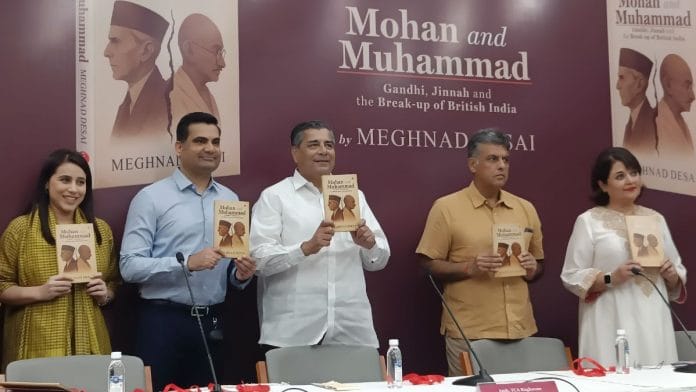New Delhi: When Lal Krishna Advani visited the mausoleum of Muhammad Ali Jinnah in Karachi in 2005, it sparked a controversy. The same happened with former foreign minister Jaswant Singh in 2009, when he authored a book on Jinnah.
In India, writing about Pakistan’s founding father only creates controversy. But Lord Meghnad Desai’s book, Mohan and Muhammad, looks into the commonalities between the lives and careers of MK Gandhi and Jinnah.
Published three months after the author’s demise, the book intertwines two lives.
“It’s otherwise not easy to do because Mahatma Gandhi sucks all the oxygen out of the room in India. And Muhammad Ali Jinnah, similarly, if he’s on the stage, nobody else can occupy that same pedestal. So it requires someone like Meghnad Desai to bring both these figures into one single frame,” said TCA Raghavan, former ambassador of India to Pakistan, at Delhi’s India International Centre (IIC) on 8 October.
He was joined at the launch of Mohan and Muhammad by politician Manish Tewari, Sanjoy Roy, Managing Director of Teamwork Arts. Journalist Marya Shakil was the panel moderator. Among the audience were former civil servants, including Montek Singh Ahluwalia.
Kishwar Desai said that her husband’s compassion and kindness defined him.
“But mostly it was his courage to speak the truth, which mattered deeply to him and for the rest of us who knew him and loved him—that was his unique quality. Apart from his curly hair, of course,” she added with a smile.
Meghnad Desai’s work looks into the complexities that shaped India’s history, and the role Gandhi and Jinnah played.
“The many ways in which their lives trod common, if not identical, paths and how they worked together in British Indian politics for nearly a quarter of a century, and then how they parted ways, but only to become the two key interlocutors at the final moment, the two representatives of the ideas of India and Pakistan,” wrote Desai in his book.
“This book is really not just Mohan and Muhammad. It’s Mohan, Muhammad, and Meghnad—and that is really the mixture,” said Kapish Mehra, managing director at Rupa Publications.
According to Mehra, Desai was one of the most disciplined authors he has ever come across. He was efficient and diligent, but at times, could get very angry. “It’s a trip down memory lane, not just for the country that was divided into two, but also for the person who took the effort to write about it,” said Mehra.
Seeds of Partition
According to Manish Tewari, Desai’s book is seminal, as the tragedy of Partition has still not been told in its entirety.
“It’s not the story of a particular individual; it is the story of contemporary India,” he said.
Initially, Jinnah was not a supporter of the idea of Partition at all, Tewari said. The change came with World War 2.
Between 1939 and 1945, most of the Congress leadership was locked up, and it was Jinnah who had the field open to himself. He spent those years in reconstructing and rebuilding the Muslim League, Tewari said.
“I wonder that even if Gandhi and Jinnah wanted to prevent the Partition of India, the historical forces which were on the march wouldn’t have allowed that to happen,” he added.
In his book, Desai tells the story of the final moments of the Partition, a development which was not even on the horizon when World War 2 started in 1939.
Tewari said that the history of the Partition is also the story of Gandhi and Jinnah. In the final denouement, as India was headed toward Partition, they remained the principal characters.
“In many ways, this book encapsulates the contradictions of those times, as to how these two individuals had a seminal role in shaping that part of contemporary Indian history,” said Tewari.
Also read: Indian students and plagiarism go long back. AI is a tool, not a problem, says ex-DU VC
Mohan and Muhammad
According to Raghavan, Desai tried to go into the profundities of Partition.
“It’s a brave thing to do to engage with Gandhi and Jinnah as individuals, and to see them as prospectively, not retrospectively,” said Raghavan.
Raghavan said the Partition impacted the subcontinent in many ways.
“The human cost of Partition was not just Punjab and Bengal, but it impacted the Muslims of India in many different ways,” he said.
(Edited by Prasanna Bachchhav)






